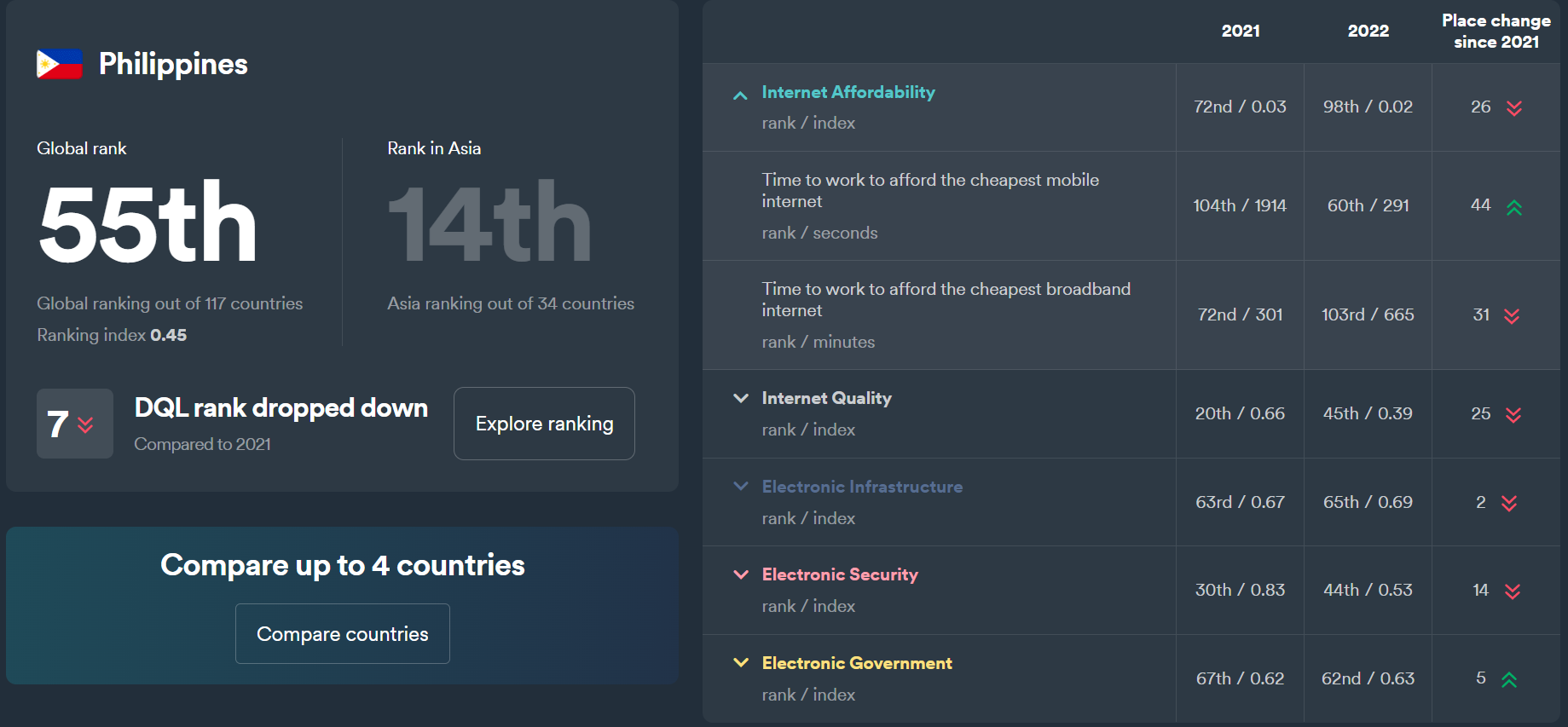Internet in the Philippines is Mediocre and Expensive But Starlink Is Now Available
hive-196233·@adamada·
0.000 HBDInternet in the Philippines is Mediocre and Expensive But Starlink Is Now Available
Starlink is about to shake up the competition for being an Internet Service Provider in the country. This is good news for the people that are fed up with this country’s existing internet services. I don't think changes would be abruptly felt even with the hype for the new product in the block but penetrating the Philippine market is a positive sign that other telecommunications companies see value doing business here. Asia is still an emerging market and there is an optimistic outlook for the Philippines in the next few decades in terms of economic growth (despite the inflation and politics hindering its progress). But first it needs to address one of the modern day basic human rights, and that's accessible, affordable, and quality internet services for the masses. In addition to adding the word mediocre and expensive to describe this country’s existing internet services, this quote taken from this article [Study: Pinoys paying for expensive but mediocre internet](https://business.inquirer.net/362497/study-pinoys-paying-for-expensive-but-mediocre-internet) > For fixed broadband connectivity, Filipinos have to work 11 hours and five minutes per month to be able to pay for it. Compared to Israel, which has internet packages costing 19 minutes of work monthly, Filipinos have to work 34 times more. Filipinos dependent on having a stable internet connection need to exert more effort in earning just to compensate for the internet costs on top of the electricity costs. The Philippines GDP isn’t dependent on agricultural exports, it’s services from industries such as Outsourced BPO and overseas Filipino workers. For a country that relies heavily on internet connection to generate bulk of its GDP, you think it should have prioritized having quality internet connection accessible to the masses but it’s not. You can show a tourist how wonderful our beaches are, how great the mountainous sceneries, and exotic animals this country has to offer but we’ll be conservative about how good our internet connections. It’s just mediocre at best and expensive relative to what an average citizen in Asia has to pay for. According to [this article]( https://www.outsourceaccelerator.com/articles/starlink-philippines/) > SpaceX offers its equipment at USD 599 or Php 33,482 per unit – a hefty sum, especially for people in remote areas. Meanwhile, its internet connectivity service is pegged at USD 99 or Php 5,535 monthly – not a cheap price either. ###### It’s certainly not a price I’d be willing to pay monthly as I’m already living within a city area and the plans available are cheaper. But if I was living in a remote area, this cost doesn’t look so bad. Access to the internet in the most remote regions of the country not only helps the people living in the area but also people transiently working in the area. I could see field researchers, missionaries, and journalists adding these services to their kit. *** I checked this country’s ranking from Surfshark’s page: <center></center> And this thing doesn’t even need to be installed under one roof when it can accommodate an entire community with shared monthly fee. To date, the Philippines’ archipelago has made it difficult to establish a reliable infrastructure for everyone to access the internet. News transmission in the countryside still relies on the radio for timely updates. I can’t recall what article I read this from but quality and access to internet showed improved literacy levels within a country. Internet access for everyone gives people a competitive advantage because information to self-educate gives people better chances at bettering themselves. This will also lead to improving their quality of life and extend to those around. You can’t help people if you yourself lack the resources. Access to internet in a far flung area also opens to flexible work from home locations. People no longer have to live in a congested city, contribute to traffic and noise pollution to have a livelihood, they can remain in the provinces and still be competitive in putting out the work while with their families. The fact that it took years for local telecommunications to improve their services right after the deal with SpaceX got more attention strengthened my beliefs that unless there are more Internet Service Providers to enter into the Philippine territory, local telecommunication services have little motivation to improve their services and are contented to monopolize the market. Spreading their reach to other countries would be the next step than improving the services here because there’s more potential for growth outside while here just means being contented with a saturated market share. If you’re one of the two or three companies with an established name providing an indispensable service, it’s hard to shake you out of the competition. If you made it this far reading, thank you for your time.
👍 steemseph, kendallron, solominer, enforcer48, kembot, gunnarheilmann, whangster79, recoveryinc, samrisso, tomtothetom, cugel, joeyarnoldvn, xanreo, zyx066, tpkidkai, movement19, liaminit1, wendyburger, hive-195880, dying, muntaharaceh, manniman, perceval, therealflaws, cthings, zhoten, nyxlabs, steemph.manila, hiveph, annazsarinacruz, bearone, appleskie, markjason, steemph.cebu, straykat, steemph.uae, sarimanok, bella.bear, juanvegetarian, yoieuqudniram, arcgspy, mvmoning2021, deythedevil, sensiblecast, dawan, asdfghjkiraaa, holdeck, ayane-chan, bluepark, cli4d, mami.sheh7, creodas, chileng17, eylz619, crimsonowl-art, yzamazing, g10a, mhowii, dafusa, joshglen, starzy, jenesa, nikkabomb, l8n, frankydoodle, brotherhood, ryleebear, danokoroafor, masterzarlyn28, doctorfate, jamiz, peterpanpan, supperbotsps.com, mamalikh13, acantoni, steembasicincome, buildingpies, sbi-tokens, sneakyninja, mastergerund, thedailysneak, babysavage, cryptoknight12, chops.support, enjar, piensocrates, itinerantph, josequintana, seeyouinlumb, gamer00, wiggl3, mrnightmare89, kneelyrac, gohenry, rachelleignacio, iameden, mervinthepogi, metapiziks, mrsexappeal, ilovegames, kothy, oadissin, fineartnow, cebu-walkers, angelbless, orphansofdoom, jazzhero, horriblesteemian, bullinachinashop, yuba.wallace, hilary.clinton, musicfan, drugsarebadmkay, adelair, pandachef, macoolette, josejirafa, dickturpin, steemcleaners, eturnerx, votehero, msp-makeaminnow, tomiscurious, hivewatchers, michellpiala, cute-cactus, junebride, marysent, juecoree, trangbaby, kimloan, whynotcamp, crazy-bee, hyhy93, ivypham, danghao, babeltrips, phuongthao98, thaolaven, lynnnguyen, winnietran, dora381, sunnyvo, lamphuong, youdontknowme, dodovietnam, john0928, herosik, edongdong, ybanezkim26, jude.villarta, romeskie, wannderingsoul, nathen007, christianyocte, erikah, b00m, spamfarmer, wittyzell, macchiata, humbe, hiddenblade, gloriaolar, leslierevales, nikv, pusen, thespacebetween, elgatomayor,